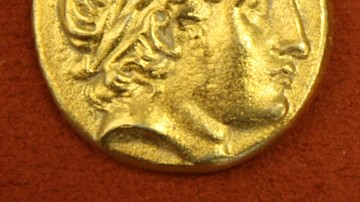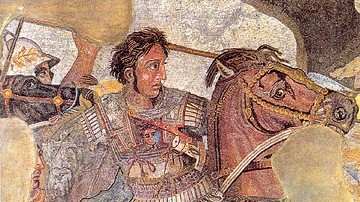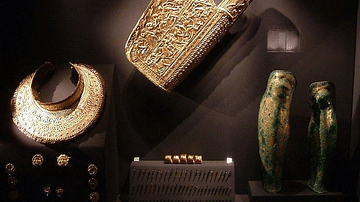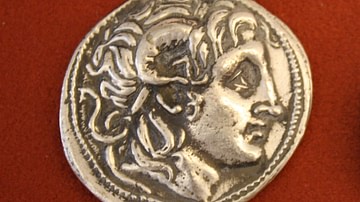
Cynane (l. c. 357- 323 BCE, pronounced `Keenahnay') was the daughter of the Illyrian Princess Audata and King Philip II of Macedon, making her the half-sister of Alexander the Great (l.356-323 BCE). Following the Illyrian tradition of women as warriors, her mother raised her in the martial arts and the belief that she was the equal of any man.
Cynane lived this belief and instilled the same values in her daughter, Adea, whom she raised to power at the cost of her own life. Following the death of Alexander the Great, Cynane sacrificed herself in arranging her daughter's marriage to Alexander's successor in order to place her in a position of power and security. Her daughter would rule with Philip III under the name Eurydice II and carry on her mother's legacy as an independent and powerful woman.
Youth & Military Achievements
When Philip II (l. 382-336 BCE) defeated the Illyrian king Bardylis in 358 BCE he took Audata, the king's eldest daughter, as a trophy of war and a means of keeping the peace. Audata became the first of Philip's seven wives among whom was also Alexander's mother, Olympias. Audata was a true Illyrian princess, a product of her culture's practice of raising girls as warriors, and instilled these values in her daughter. She brought Cynane up in the Illyrian tradition, teaching her martial arts and to hunt, track, ride, and fight better than most men. Before she was twenty, Cynane was well known for these skills and became famous for her courage and brilliance in battle.
She grew up at the court of Philip II alongside Alexander and those friends of his who would later become the generals of his army. Any young woman in the Macedonian court would have been expected to behave herself as befitted her gender but Cynane refused to be dominated by any man. Scholar James Romm writes:
Cynane grew up at the Macedonian court but stayed true to her maternal traditions, for Illyrian women were famously tough, capable of going to war as men did. In her teens Cynane is said to have accompanied the Macedonian army on a campaign into Illyria and to have slain a queen of that country - perhaps one of her own relatives - in hand-to-hand combat. Unfortunately, no account survives of that encounter between two armed female leaders, the first such encounter known to European history. (164)
Cynane rode into battle alongside Alexander and his friends on numerous occassions but became legendary after she turned the tide of battle with the Illyrians single-handedly. The Macedonian historian Polyaenus comments:
Cynane, the daughter of Philip, was famous for her military knowledge: she conducted armies, and in the field charged at the head of them. In an engagement with the Illyrians, she with her own hand slew Caeria their queen; and with great slaughter defeated the Illyrian army. (1)
This particular story of Cynane's courage was most likely widely circulated by oral tradition before historians like Polyaneaus set it down in writing. Her victory over the Illyrians made her a legend but it was her struggle to control her own life, and provide a better future for her daughter, which made her of interest to the ancient historians like Polyaneus who would make her immortal.
Marriage & Autonomy
By the will of Philip II, Cynane was given in marriage to her cousin Amyntas and gave birth to a daughter, Adea. After Philip II was assassinated in 336 BCE she tried to rouse Amyntas to action and pushed him to seize the throne but he ignored her advice. Whether he simply refused to take the counsel of a woman or was afraid to take the risk is unknown but it was a grave mistake.
When Alexander the Great took the throne of his father he had Amyntas killed, recognizing that Cynane might attempt to do exactly what she had been doing. She was a widow, then, in her early twenties and would have been expected to marry again but she refused all offers and, interestingly, was able to maintain her autonomy even though it was very much in the interests of the new king to marry her off quickly to some non-threatening suitor.
There is no record of how Cynane was able to manipulate the situation and resist Alexander's designs for her life but it is clear she remained single in spite of his best attempts. He tried to neutralize Cynane by marrying her off to Langarus, King of the Agrianians (a Paeonian-Thracian tribe of Upper Strymon in present-day Bulgaria) but the groom died of a mysterious illness just prior to the marriage. While there is no proof, it is likely Cynane had Langarus poisoned in order to keep herself from becoming a pawn in Alexander's game.
Alexander's Death
Alexander had more on his mind than just subduing an upstart sister, however, and soon mobilized his army to accomplish what his father had planned for but never lived to achieve: the conquest of Persia. When Alexander left with is troops, Cynane remained in Macedonia with Adea and focused on her upbringing, teaching her hunting, riding, and fighting in the Illyrian tradition. Alexander's mother, Olympias, was a powerful presence at court and, as Olympias' jealousy concerning Philip's other wives and their offspring was legendary, it seems strange that the queen made no attempts to remove Cynane and Adea at this time. Quite likely, as Olympia was adept at court intrigue, she was simply biding her time and waiting for the right moment.
When Alexander the Great died at Babylon in 323 BCE he left an enormous power vaccum which his generals tried to fill. Alexander's half-brother, Arrhidaeus, succeeded him, a man known as a "half wit" who suffered some kind of mental impairment from an accident in his youth (or, according to some sources, from Olympia's attempt at poisoning him to remove him as a threat to Alexander). Arrhidaeus held no actual power and was only a pawn of the regent Perdiccas, Alexander's former right-hand man, and the other generals who now assumed control of the army. These four generals (known as the Diadochi, `the successors') put their pawn in play while they waited for Alexander's widow, Roxanne, to deliver her unborn child. If the child was male, they planned to declare a co-regency of Arrhidaeus and the boy while keeping actual power for themselves.
Cynane's Power Play
Cynane, however, saw her own opportunity in her half-brother's death and moved quickly to take advantage of it. She was only in her early thirties at the time, and a very eligible match, so she could have offered herself as a bride to Arrhidaeus but chose to raise Adea up instead. Quickly mobilizing her troops, Cynane led Adea and her army toward Babylon to force a marriage which would secure her daughter's future as well as her own. James Romm comments on this, writing:
Such a move would deeply unsettle the already shaky power structure at Babylon. It would add legitimacy to one of the two reigning kings [Arrhideaeus and Roxanne's child] and strenghthen the monarchy as a whole, thus reducing the influence of the generals. Indeed it might eliminate the board of four custodians altogether since Adea, once queen, would be able to speak and act for her royal husband. (165)
Cynane would be able to seize power through her daughter and, as a daughter of Philip II and Alexander's half-sister, would naturally command the loyalty of Alexander's great army.
Alcetus & the Death of Cynane
Upon hearing of Cynane's move, Perdiccas sent Antipater, one of Alexander's generals, against her in Strymon where she defeated him swiftly through superior tactics. Driving him from the field, she continued on toward Babylon. Perdiccas knew he had to stop her advance and so mobilized a second force to send against her. He carefully chose his brother, Alcetus, to lead the Macedonians not because of Alcetus' skill in battle but because he had been one of Cynane's companions at court when they were young. The plan seems to have been that the sight of her old friend leading an armed force against her would cause Cynane to abandon her mission and return quietly to Macedonia. Failing that, Perdiccas' hopes rested on Alcetus managing to defeat her honorably in battle and neutralize any further interference from her.
Neither of these possibilities were realized, however. When the two Macedonian forces met on the field, Cynane confronted Alcetus personally and "delivered a stinging reproach of his ingratitude and disloyalty" from the back of her horse. Polyaenus writes:
The Macedonians at first paused at the sight of Philip's daughter, and the sister of Alexander: while after reproaching Alcetas with ingratitude, undaunted at the number of his forces, and his formidable preparations for battle, she bravely engaged him; resolved upon a glorious death, rather than, stripped of her dominions, accept a private life, unworthy of the daughter of Philip. (1)
Believing in her cause, and in own personal power to bend Alcetus and his generals to her will, Cynane underestimated the ambitions of Perdiccas and how far Alcetus was willing to go to keep his brother and the other generals in power; Alcetus killed her before she finished her speech.
With Cynane's death, Alcetus thought, any questions about succession would die as well and his brother and the other generals would be secure in their plans. When the Macedonian army witnessed Cynane's assassination at the hands of their general, however, they revolted and demanded that Adea, as Alexander's niece and Philip II's grandaughter, be married to Arrhidaeus as Cynane wished.
Cynane's Legacy
Adea married Arrhideaeus (who became Philip III) and changed her name to Eurydice, the name by which she is remembered. As her mother had imagined, Eurydice became the power behind Philip III, speaking for him and making decisions on his behalf even before the First War of the Diadochi and the death of Perdiccas. After Perdiccas' death, she assumed more power in the name of her husband, taking part in treaties, addressing public assemblies, and establishing herself as a significant political force.
Her achievements were not appreciated by Olympias, however, who had certainly never been fond of her or her mother and now took action. Eurydice was arrested under Olympias' orders, imprisoned, and then forced to commit suicide after Philip III was executed in 317 BCE. Eurydice's accomplishments reflect the values instilled in her by Cynane who refused to play by anyone else's rules. Although often overlooked by later historians, Cynane's actions following the death of Alexander the Great significantly influenced what followed after and she is remembered as a powerful and independent warrior princess at a time when most women, even those of nobility, were neither.





